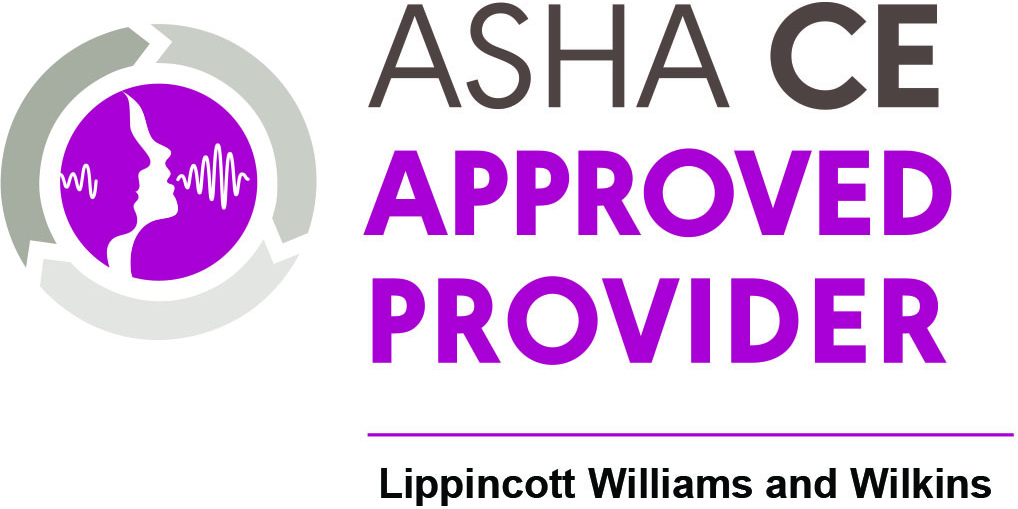{{ (moduleVm.actions && moduleVm.changeStatus) ? moduleVm.status : '' }} Improving Language by Exploring Pragmatic Differences
Activity Steps
Description
Note: ASHA CEUs cannot be reported to ASHA unless your ASHA member number is included in your profile.This course will provide speech-language pathologists (SLPs) with strategies to assist with identifying pragmatic language differences. The learner will be able to identify the relationship between pragmatic language and language development. This program includes information about the available research describing verbal pragmatic skills development.
Accreditation
This course is offered for 0.25 ASHA CEUs
(Intermediate Level, Professional Area)
Purpose of Activity
To gain knowledge about school-aged children with pragmatic language skills and the relation to language learning disabilities.Learning Objectives
After completing this continuing education activity you will be able to:
- Recognize strategies to identify pragmatic language difficulty.
- Explain the relationship between pragmatic language and language development.
- Identify the available research describing verbal pragmatic skills development.
Learning Outcomes
Seventy-five percent of participants will demonstrate knowledge about speech-language pathologist (SLP) interventions for improving language by exploring pragmatic differences as presented in 2 of the 3 articles in the Topics in Language Disorders journal July-August 2023 issue for speech-language pathologists (SLPs) by achieving a minimum score of 80% on the outcomes-based posttest.Disclosures
Article 1 Title: "Pragmatic Skills in School-Age Children with Primary Language Impairment and Language-Learning Disabilities: A Scoping Review of Research from 1990 to 2022"
Article Funding Disclosure: Dr. Troia is co-editor of the journal Topics in Language Disorders, for which he receives a stipend, and serves on the editorial boards of several top special education journals. He is an author of the phonological awareness intervention program for young at-risk children called Promoting Awareness of Speech Sounds (PASS), published by Attainment Company, for which he receives royalties, and receives funding through the Institute of Education Sciences. Lauren (Lo) Hennenfent, EdM, MA, CCC-SLP receives a scholarship with the National Center for Leadership in Intensive Intervention which is funded by the Offices of Special Education (OSEP).
Author Disclosures:
Gary A. Troia, PhD, CCC-SLP
Financial: Dr. Troia is Associate Professor of special education at Michigan State University and receives a salary. He is an author of the phonological awareness intervention program for young at-risk children called Promoting Awareness of Speech Sounds (PASS), published by Attainment Company, for which he receives royalties. With fellow researchers Lori Skibbe and Ryan Bowles and funding through the Institute of Education Sciences, he has developed an online phonological awareness assessment for young children with complex communication needs called ATLAS-PA, one component of the Access to Literacy Assessment System, for which he does not receive royalties. Dr. Troia is co-editor of Topics in Language Disorders and receives a stipend for this work. The other Co-Editor of Topics in Language Disorders, Dr. Sarah Wallace, served as action editor for this article.
Nonfinancial: Dr. Troia is Associate Professor of special education at Michigan State University. Dr. Troia is co-editor of the journal Topics in Language Disorders, for which he receives a stipend, and serves on the editorial boards of several top special education journals. Dr. Troia has authored over 70 research papers, book chapters, and white papers and has given numerous presentations about his work in the areas of phonological processing and awareness, writing assessment and instruction, and teacher professional development in literacy.
Author Disclosures:
Lauren (Lo) Hennenfent, EdM, MA, CCC-SLP
Financial: Lauren (Lo) Hennenfent is a doctoral student in special education at Michigan State University. She receives tuition remission and research/travel stipends through her scholarship with the National Center for Leadership in Intensive Intervention, which is funded by the Office of Special Education (OSEP).
Nonfinancial: Lauren (Lo) Hennenfent's research interests include the connections between reading, writing, and oral language in students with language-based learning disorders.
Author Disclosures: Mei Shen, PhD
Financial: Dr. Shen has no relevant financial relationships to disclose.
Nonfinancial: Dr. Shen is Assistant Professor of special education at California State University, Sacramento. She completed her doctoral degree at Michigan State University with a graduate specialization in language and literacy education. Her research focuses on literacy assessment and instruction for struggling students. Dr. Shen is particularly interested in instructional practices to help improve the reading and writing performance of students with language-based learning disabilities.
---------------------------------------------------------------------
Article 2 Title: "Relations between Pragmatic Language and Literacy-related Skills in Omani Elementary Students"
Article Funding Disclosure: Gary A. Troia, PhD, CCC-SLP is Co-Editor of the Topics in Language Disorders journal and has a financial relationship with Wolters Kluwer.
Financial: Dr. Troia is Associate Professor of special education at Michigan State University and receives a salary. He is an author of the phonological awareness intervention program for young at-risk children called Promoting Awareness of Speech Sounds (PASS), published by Attainment Company, for which he receives royalties. With fellow researchers Lori Skibbe and Ryan Bowles and funding through the Institute of Education Sciences, he has developed an online phonological awareness assessment for young children with complex communication needs called ATLAS-PA, one component of the Access to Literacy Assessment System, for which he does not receive royalties. He is Co-Editor of the Topics in Language Disorders journal and has a financial relationship with Wolters Kluwer. The other Co-Editor of Topics in Language Disorders, Dr. Sarah Wallace, served as action editor for this article.
Nonfinancial: Dr. Troia is Associate Professor of special education at Michigan State University. Dr. Troia is co-editor of the journal Topics in Language Disorders, for which he receives a stipend, and serves on the editorial boards of several top special education journals. Dr. Troia has authored over 70 research papers, book chapters, and white papers and has given numerous presentations about his work in the areas of phonological processing and awareness, writing assessment and instruction, and teacher professional development in literacy.
Mahmoud Mohamed Emam, PhD
Financial: Dr. Emam has no relevant financial relationships to disclose.
Nonfinancial: Dr. Emam has no relevant nonfinancial relationships to disclose.
Credits:
- ASHA 0.25 CEU